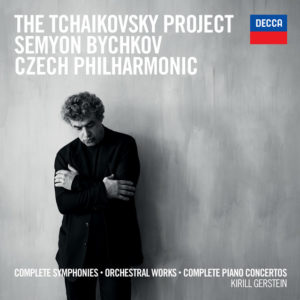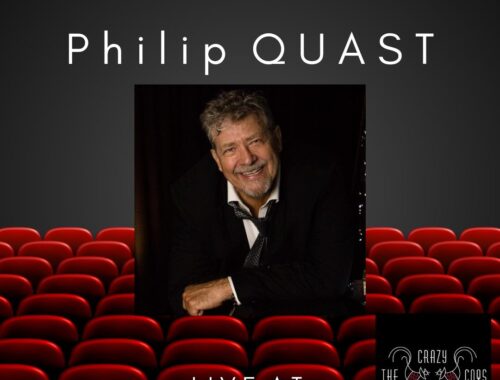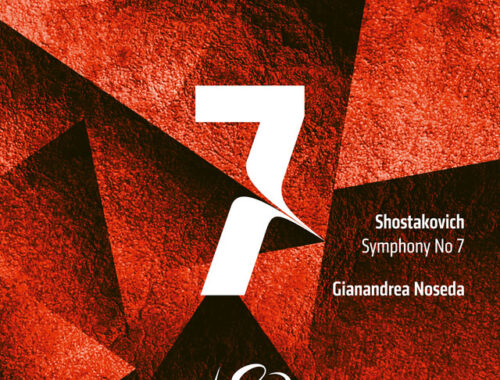GRAMOPHONE Review: Tchaikovsky: ‘The Tchaikovsky Project’ Complete Symphonies & Piano Concertos – Gerstein, Czech Philharmonic/Bychkov
 Now we have the complete portrait, as it were, of Tchaikovsky through the eyes of Semyon Bychkov many of the issues I addressed when reviewing the original releases of the 6th ‘Pathétique’ and Manfred Symphonies are thrown into high-relief. There is a consistency of vision and scale here that may not be to everyone’s taste – thrill-seekers and those clinging to a more extravagant view of the Tchaikovsky symphonies will surely be disappointed – but anyone who remains fascinated by the composer’s ability to plot and maintain a sure and steady course between the classical and the romantic will find much to savour here. There is charm and beauty aplenty and a self-evident ‘connection’ with the music. But equally, an emotional restraint.
Now we have the complete portrait, as it were, of Tchaikovsky through the eyes of Semyon Bychkov many of the issues I addressed when reviewing the original releases of the 6th ‘Pathétique’ and Manfred Symphonies are thrown into high-relief. There is a consistency of vision and scale here that may not be to everyone’s taste – thrill-seekers and those clinging to a more extravagant view of the Tchaikovsky symphonies will surely be disappointed – but anyone who remains fascinated by the composer’s ability to plot and maintain a sure and steady course between the classical and the romantic will find much to savour here. There is charm and beauty aplenty and a self-evident ‘connection’ with the music. But equally, an emotional restraint.
Under Bychkov the emotion is always ‘contained’ – contained until it can be contained no more, as in the great development section of the Pathétique first movement: a controlled panic attack which I described in my original review as ‘classical in form, neurotic in nature’. With Bychkov you are never in doubt as to where Tchaikovsky places the moment of climax – in the case of the Pathétique development, the mighty sostenuto passage for strings answered in breast-beating trombones. But for more in the way of histrionics, for a performance taking us closer to, if not over the edge, you need to turn to Teodor Currentzis and his MusicAeterna. And so it is here throughout the later symphonies and pieces like Francesca da Rimini which never boldly goes where Stokowski or Bernstein (Israel PO not NYPO) hellishly go. You don’t turn to this set for sonic thrills.
But equally you are never left in doubt as to Bychkov’s deep affection, indeed love, for this music and in the Czech Philharmonic he has found an orchestra with roots in that precious Austro-Hungarian tradition which in its respect for the music’s classical elegance enables Bychkov to take a fresh perspective on it. The Czech sound is abundantly warm and inviting but modest and unflashy in colour, cast, and delivery. It’s the kind of playing that frees the music to do its embraceable thing. I’m thinking immediately of the cellos taking up the evocative horn theme in the second movement of the First Symphony ‘Winter Daydreams’, a performance at once homespun and personal – daydreams enjoyed from the warmth of the fireside or through the rustic primitivism of an old woodcut. Private not public. Those burgeoning horns at the central climax are hardly a wide-screen spectacle but what they give us is entirely in context to the reading as a whole.
This cycle does not trade in brilliance, in conspicuous virtuosity for its own sake or what might be called the imperial splendour of Tchaikovsky’s music. In a way the subtitle of ‘Little Russian’ for the Second Symphony typifies Tchaikovsky’s own modesty and restraint. This piece is a miniature at heart and has the air of the ‘divertissement’ about it. It’s piquant, eminently balletic. Even the final – which opens like an allusion to Mussorgsky’s ‘Great Gate’ – quickly turns to Mozartian playfulness. A single tam-tam stroke brings us back to Mussorgsky but again it’s a jolly piccolo who leads the procession through that Great Gate.
Bychkov has really enhanced my appreciation of the Third Symphony ‘Polish’ where, like those delightful character dances from the great ballets, an unforced delight in the music is all that is required to unlock the charm. The phrasing from Bychkov’s Czech Philharmonic is all so effortless, the second movement waltz and the ensuing Andante elegiaco ‘sung’ in such a way as to sound familiar and much-loved even at first hearing.
My suggestion there that the best thing about these performances is the sense that the pieces are somehow revealed in the phrasing of them is particularly evident with the Fourth. The passion is in the imperative of the musical argument; the choices feel right with every transition inevitable but not predictable. It’s all of a piece. And, as throughout this set, it’s Tchaikovsky’s lyric invention that scores time and again – songful, graceful, balletic. The beauty of the playing lies in its all-pervasive honesty, the way the sound always relates to the phrasing, the way that there is always a clear musical reason for every sound, every gesture. This is not an orchestra to wear its virtuosity like a badge of honour – which makes Bychkov (as with Jiri Belohlavek before him) such a good fit for them.
That said, the missing dimension here is (to use a word elusive in meaning) ‘temperament’. The music is full of it and in performances like that of the Fifth Symphony I don’t always feel it. Even without Yevgeny Mravinsky’s celebrated (notorious?) rubatos there is a potency about his famous later recording with the Leningrad Philharmonic which has one on the edge of one’s seat. We all want more in the way of fireworks from this piece nowadays, don’t we? Not here.
The set also includes the three Piano Concertos (including the original version of the epic and much-underrated Second) and in choosing Kirill Gerstein to record them Bychkov is further endorsing his manifesto for this music. Gerstein gives us the original 1879 version of the First Concerto which begins with the celebrated chords at the outset arpeggiated for a lighter effect. Thereafter the pianist goes out of his way (and I think slightly self-consciously) to promote a more lyric – he says ‘Schumannesque’ – view of the piece conspicuously eschewing bombast and showmanship. Sorry, but I miss the adrenalin rush when the virtuosic elements we know and love are bigged-up. There, I’ve said it.
You May Also Like

Edward Seckerson meets CELINDE SCHOENMAKER
23/03/2023
PHILIP QUAST and EDWARD SECKERSON: Live at Crazy Coqs
14/01/2025

